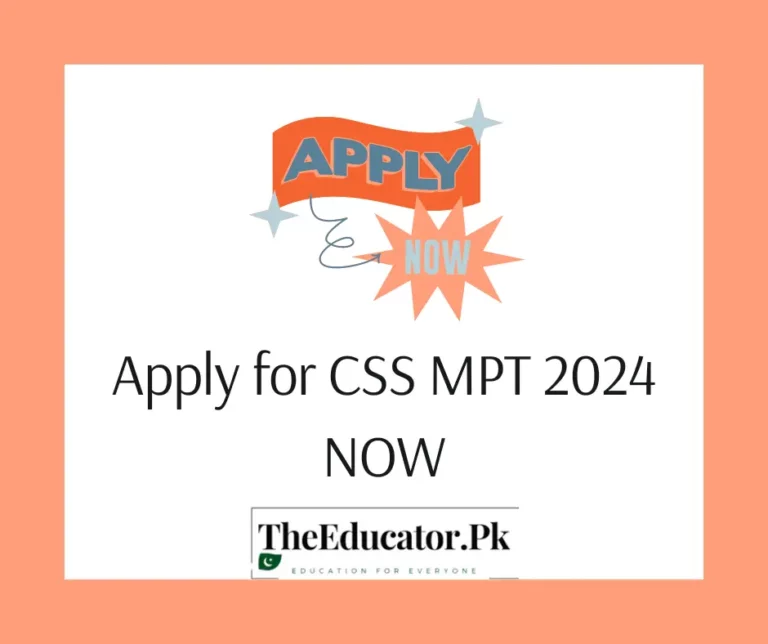Syllabus of CSS Exams 2023
If you are seeking answers to your confusion about how to prepare for CSS examinations and which subjects to take, then you have come to the right place. We will share the syllabus and details for CSS exams.
The CSS (Central Superior Services) exams are a competitive examination held annually in Pakistan to recruit individuals into various civil service positions. The exams are highly competitive, with only a small percentage of applicants being successful each year.
The CSS exams are held annually in February, with applications typically opening in September of the previous year. Those interested in applying for the CSS exams in 2023 should prepare well in advance, as the competition is fierce and the syllabus is demanding.
Eligibility Criteria for CSS Exams
CSS exam eligibility requirements vary depending on the specific requirements of the Federal Public Service Commission (FPSC), which administers the exams. However, there are some general requirements that all candidates must meet to be eligible to apply for the CSS exams.
These include:
- Citizenship: Candidates must be citizens of Pakistan.
- Age: CSS candidates must be between 21 and 28 on the first day of the exam year.
- Educational Qualifications: Candidates must have at least a bachelor’s degree from a recognized university.
- Physical Fitness: Candidates must be physically fit and meet the medical standards set by the FPSC.
- Domicile: Candidates must meet the domicile requirements set by the FPSC, which vary depending on the province or territory in which they reside.
Candidates who meet these general eligibility requirements can apply for the CSS exams. However, it is important to note that meeting the eligibility criteria does not guarantee acceptance into the CSS exams. The competition is high, and only a small percentage of applicants are successful each year.
Syllabus of CSS Exams 2023
The syllabus for the CSS exams is extensive and covers a wide range of subjects. It includes six compulsory and optional subjects, which candidates can choose from over 40 options.
1. Compulsory Subjects (600 Marks)
CSS exams include compulsory subjects, which play an important role in the overall selection process. These subjects cover various topics designed to test candidates’ knowledge and ability in various areas. Candidates must have a solid understanding of these subjects and be able to apply their knowledge to real-world situations.
The compulsory subjects are as follows:
| Sr No | Subject | Pattern | Marks |
| 1 | English Essay | The candidates are required to write one or more essays in English. There will be a wide variety of topics available. | 100 |
| 2 | English (Precis and Composition) | I. Precis Writing – 20 Marks II. Reading Comprehension – 20 Marks III. Grammar and Vocabulary – 20 Marks IV. Sentence Correction – 10 Marks V. Grouping of Words – 10 Marks VI. Pairs of Words – 10 Marks VII. Translation – 10 Marks |
100 |
| 3 | General Science & Ability | Part-I (General Science) – 60 Marks I. Physical Sciences Constituents and StructureProcess of NatureNatural Hazards and DisastersEnergy Resources Atomic Structure Modern Materials/Chemicals II. Biological Sciences Biomolecules Plant and Animal Kingdom A Brief Account of Human Physiology Common Diseases and Epidemics New Model Concept of Producing BIO Fuel Method III. Environmental Science Atmospheric Pollution Water Pollution Land Pollution IV. Food Science Quality of Food Food Deterioration and its Control V. Information Technology Telecommunications Part-II (General Ability) – 40 Marks Analytical Reasoning/Ability VIII. Mental Abilities |
100 |
| 4 | Current Affairs | I. Pakistan’s Domestic Affairs (20 marks) PoliticalEconomicSocialII. Pakistan’s External Affairs (40 marks) III. Global Issues (40 marks) |
100 |
| 5 | Pakistan Affairs | II. Ideology of Pakistan II. Land and people of Pakistan III. Pakistan and Changing Regional Apparatus IV. Nuclear Program of Pakistan V. Regional Cooperation Organizations VI. Civil-Military Relations in Pakistan VII. Economic Challenges in Pakistan VIII. Non-Traditional Security Threats in Pakistan IX. Pakistan’s Role in the Region X. The Palestine Issue XI. Changing Security Dynamics for Pakistan XII. Political Evolution Since 1971 XIII. Pakistan and US War on Terror XIV. Foreign Policy of Pakistan Post 9/11 XV. Evolution of Democratic System in Pakistan XVI. Ethnic Issues and National Integration XVII. Hydro Politics XVIII. The national interest of Pakistan XIX. Sovereignty challenges XX. The energy problems in Pakistan XXI. Relations between Pakistan and its neighbors XXII. Relations between Pakistan and India XXIII. Issues related to Kashmir XXIV. Afghanistan’s war since 1979 and its impact XXV. Proxy Wars: Role of External Elements XXVI. Economic Conditions of Pakistan XXVII.The Recent Constitutional and Legal Debates XXVIII. Strategies for addressing Pakistan’s social problems. |
100 |
| 6 | Islamic Studies OR Comparative Study of Major Religions (For Non-Muslims) |
I. Introduction to Islam. Concept of IslamImportance of Din in Human LifeDifference between Din and ReligionDistinctive Aspects of Islam Islamic Beliefs & its Impact on Individuals & Society and the Fundamentals of Islam Islamic Worships Spiritual, Moral, and Social Impact. II. Study of Sirah of the Prophet Muhammad (PBUH) as a Role Model for Diplomat Educator Military Strategist Peace Maker III. Human Rights & Status of Women in Islam The dignity of Men and Women IV. Islamic Civilization and Culture Human Personality and Community: The Role of Civilization Characteristics of Islamic Civilization (Tawhid, Self-purification, Dignity of Man, Equality, Social Justice, Moral Values, Tolerance, Rule of Law) V. Islam and the World Islam’s role in modern society The Muslim World and Contemporary Challenges The rise of extremism VI. The concept of public administration in Islam The Qur’an, the Sunnah, and the Fiqh in relation to Governance Islamic Governance Structure (Shura, Legislation, Islamic Law Sources) Hazrat Umar’s (RA) and Hazrat Ali’s (RA) letters to different authorities under the Pious Khilafat. Civil servants’ responsibilities Accountability system in Islam VII. An Islamic code of life The social system System of government The economic system System of Judiciary The administrative system Ijma and Ijtihad Procedures Religions in Comparative Perspective (For Non-Muslims Scriptures Hindu Doctrines Ways to Liberation Hindu gods Major Hindu Sects Hindu society Hinduism in the Modern World III. Buddhism Scriptures Buddhist Sects Buddhism in the Modern world IV. Judaism Jewish Scriptures Articles of faith and basic teachings Jewish holidays and festivals Jewish holidays and festivals Jewish sects and movements V. Christianity Scriptures Basic Doctrines Christian Sects Christian Festivals and Holidays Christian worship and Sacraments Christianity in the Modern Times VI. Islam Sacred Scriptures Basic Doctrines and Creed Basic Doctrines and Creed Other Teachings of Islam Sects and Schools Contemporary Islamic movements and tendencies |
100 |
| Total | 600 |
Related:- PMDC MDCAT Syllabus 2022 PDF Download
2. Optional Subjects (600 Marks)
In addition to six compulsory subjects, candidates can choose four optional subjects from a list of over 40 options. These optional subjects cover many topics, such as history, economics, political science, sociology, psychology, law, agriculture, and more.
Candidates need to have a strong foundation in their chosen optional subjects and possess real-world application skills. The optional subjects are an integral part of the CSS exams and play a significant role in the overall selection process.
If you are considering applying for the CSS exams, you should carefully select your optional subjects and ensure that you thoroughly understand them.
Check:- 10th Class Result 2023
Group-I
There are 5 subjects in group-I. Candidates can choose one subject from Group-I’s list of optional subjects. This subject will be worth 200 marks and an important part of the overall CSS exams.
| Sr No | Subject | Marks |
| 1 | Accountancy & Auditing | 200 |
| 2 | Economics | 200 |
| 3 | Computer Science | 200 |
| 4 | Political Science | 200 |
| 5 | International Relations | 200 |
Group-II
There are 6 subjects in group II. The subjects in this group can be chosen as one 200-mark subject or two 100-mark subjects.
| Sr No | Subject | Marks |
| 1 | Physics | 200 |
| 2 | Chemistry | 200 |
| 3 | Applied Mathematics | 100 |
| 4 | Pure Mathematics | 100 |
| 5 | Statistics | 100 |
| 6 | Geology | 100 |
Group-III
There are 4 subjects in group III. Among these subjects, you may select one for 100 marks.
| Sr No | Subject | Marks |
| 1 | Business Administration | 100 |
| 2 | Public Administration | 100 |
| 3 | Governance & Public Policies | 100 |
| 4 | Town Planning & Urban Management | 100 |
Group-IV
There are five subjects in group IV. Among these subjects, you may select one for 100 marks.
| Sr No | Subject | Marks |
| 1 | History of Pakistan & India | 100 |
| 2 | Islamic History & Culture | 100 |
| 3 | British History | 100 |
| 4 | European History | 100 |
| 5 | History of USA | 100 |
Group-V
Group V consists of seven subjects. You may select one for 100 marks out of these subjects.
| Sr No | Subject | Marks |
| 1 | Gender Studies | 100 |
| 2 | Environmental Sciences | 100 |
| 3 | Agriculture & Forestry | 100 |
| 4 | Botany | 100 |
| 5 | Zoology | 100 |
| 6 | English Literature | 100 |
| 7 | Urdu Literature | 100 |
Group-VI
Group VI consists of seven subjects. You may select one for 100 marks out of these subjects.
| Sr No | Subject | Marks |
| 1 | Law | 100 |
| 2 | Constitutional Law | 100 |
| 3 | International Law | 100 |
| 4 | Muslim Law & Jurisprudence | 100 |
| 5 | Mercantile Law | 100 |
| 6 | Criminology | 100 |
| 7 | Philosophy | 100 |
Group-VII
Group VII consists of eleven subjects. You may select one for 100 marks out of these subjects.
| Sr No | Subject | Marks |
| 1 | Journalism & Mass Communication | 100 |
| 2 | Psychology | 100 |
| 3 | Geography | 100 |
| 4 | Sociology | 100 |
| 5 | Anthropology | 100 |
| 6 | Punjabi | 100 |
| 7 | Sindhi | 100 |
| 8 | Pashto | 100 |
| 9 | Balochi | 100 |
| 10 | Persian | 100 |
| 11 | Arabic | 100 |
General Instructions
- It is important to answer questions in regional languages ( Urdu or other Pakistani dialects like Punjabi, Sindhi, Pashto, and Balochi), Persian and Arabic. Answer the question according to the instructions on the question paper if it concerns translation from another language into English or vice versa.
- Those subjects with 200 marks will have two papers with 100 marks each. Those subjects with 100 marks will have one paper. Each paper will be 3 hours long.
- There will be 20 MCQs in each compulsory paper except for the essay paper. Similarly, there will be 20 MCQs in each optional paper except Pure Mathematics and Applied Mathematics.
- The question paper in Islamic Studies OR Comparative Study of Major Religions (For Non-Muslims) is to be answered in English or Urdu only. All other papers must be answered in English unless otherwise directed in the Question Paper.
- In the case of non-Muslim candidates, they may choose either Islamic Studies or Comparative Study of Major Religions.
Tips for Selecting Optional Subjects in CSS Exams
Here are some tips to help you select optional subjects for the CSS exams:
- Consider your strengths and interests: Choose subjects you are passionate about and have a strong foundation in. This will not only make the studying process more enjoyable, but it will also increase your chances of success in the exams.
- Research the demand for each subject: Some subjects may be more in demand than others, depending on current trends and the needs of the government. Researching the potential for each subject can help you make an informed decision.
- Consider the difficulty level of each subject: Some subjects may be more challenging than others, so it’s important to choose subjects that you feel comfortable with and are confident in your ability to succeed.
- Check the syllabus and exam format: Make sure you fully understand the syllabus and exam format for each subject you are considering. It will help you determine if the subject is a good fit for you and if you can complete the required coursework.
- Seek advice from mentors or professionals: Consider seeking advice from mentors or professionals in the field you are interested in. They can provide valuable insights and guidance on the subject selection process.
Overall, it’s essential to choose optional subjects that align with your strengths, interests, and career goals. Careful consideration and thorough research can help you make an informed decision and increase your chances of success in the CSS exams.
Preparing for the CSS exams requires dedication, hard work, and a strong foundation in the relevant subject matter. Candidates should carefully consider their choice of optional subjects, as these play a significant role in the overall selection process.
Success in the CSS exams is highly competitive, with only a small percentage of applicants being successful each year. However, a civil service career can be successful with determination and a thorough understanding of the syllabus.
This article contains all the information you need about the CSS syllabus. We welcome your questions and comment.
FAQs
Q: Can I choose any optional subjects for the CSS exams in 2023?
Ans: Candidates can choose any optional subjects from the list provided by the Federal Public Service Commission (FPSC), which administers the CSS exams.
It is essential to carefully consider your choice of optional subjects, as these play a significant role in the overall selection process. Candidates should choose subjects that align with their strengths and interests and have a strong foundation in the relevant subject matter.
Q: How can I prepare for the CSS exams in 2023?
Ans: To prepare for the CSS exams 2023, you must have a solid foundation in the relevant subject matter and be able to apply your knowledge to real-world situations.
It is also important to stay up-to-date on current affairs and understand Pakistan’s history, culture, and politics well. Practicing past exam papers and seeking guidance from mentors or professionals can help prepare for the CSS exams.
Q: Do I need a bachelor’s degree to apply for CSS?
Ans: Yes, it is necessary to have an accredited bachelor’s degree to be eligible to apply for the CSS exams in 2023. Candidates must also meet other eligibility requirements such as age, citizenship, and physical fitness.






